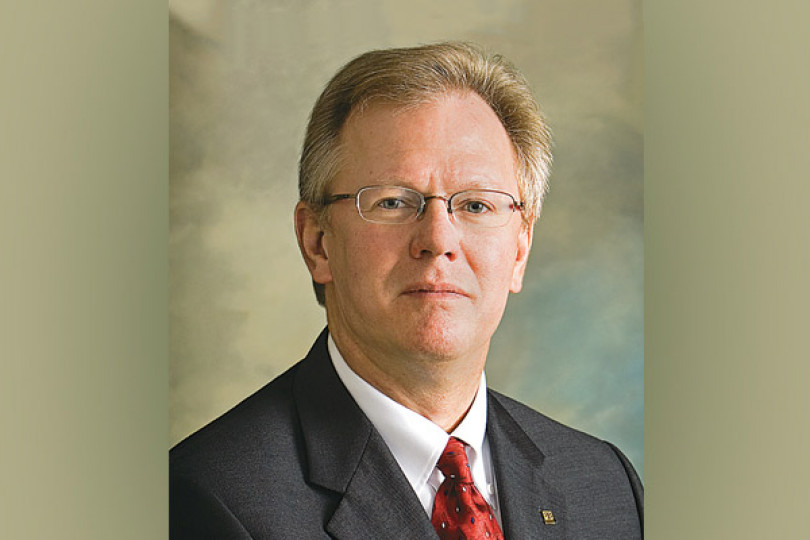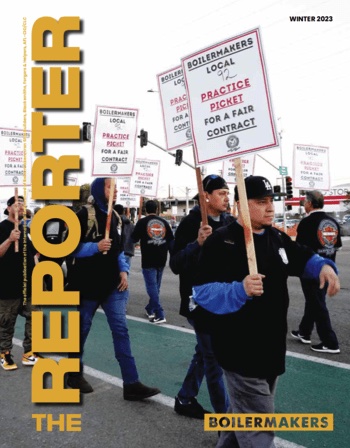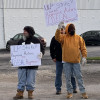Challenger places profit ahead of working people
AS THE NOVEMBER 6 general election nears, the United States faces a pivotal decision about its future. Do we elect a champion of working people or a champion of big business? It is a simple question, but the answer carries far-reaching implications.
If Barack Obama is reelected, workers and consumers will continue to be served by a president who seeks to balance the power and wealth of major corporations — and the richest one percent — with the needs and dreams of those who labor for a living. If Mitt Romney is elected, he will seek to push aside regulations, government oversight, and unions to allow big banks and big corporations to squeeze more profit out of their employees and the economy.
Seldom in the history of U.S. politics has there been such a striking contrast between two candidates.
Romney lays out plan to gut unions
ROMNEY’S ANTIUNION goals pose a major threat to the strength and future of organized labor in the United States. His public statements make clear the actions he would take going forward.
On Feb. 23, 2012, he addressed the Associated Builders and Contractors, a notoriously antiunion group, in Phoenix. Here’s what Romney told ABC:
“If I become the president of the United States, I will curb the practice we have in this country of giving union bosses an unfair advantage in contracting. One of the first things I will do, actually on day one, is I will end the government favoritism toward unions and contracting on federal contracts, and end project labor agreements, and I will fight to repeal Davis-Bacon. I also of course will make sure that workers have the right to a secret ballot, and I will fight for right-to-work laws.”
Think about it. On the very first day of his presidency, he would attack organized labor.
Prevailing wage laws and project labor agreements for federally-funded projects ensure that employers do not use public funds to enrich themselves while paying their employees less-than-competitive wages. And they ensure that the public gets real value for its investments by discouraging contractors from low-balling their bids and using a substandard, low-wage workforce.
Romney’s pledge to back “secret ballot” organizing elections is directed at union efforts to level the playing field through the Employee Free Choice Act. He prefers the current situation, where employers can drag out elections, hire union-busting consultants, and muscle their employees into voting against the union.
And his promise to promote right-to-work-for-less laws demonstrates the kind of labor-management landscape he envisions — one in which unions must struggle to hold their membership together while free-riders drain away union resources.
Corporations aren’t people
WITHOUT A DOUBT, Romney’s world view is business focused — so much so that he once remarked that “Corporations are people, too.” Of course, we understand that businesses are essential for our economy and jobs. The majority of Boilermakers depend on businesses for their livelihoods. And we work very well with most of those businesses, as evidenced by our tripartite relationships with contractors and owners.
But there is something fundamentally flawed about Romney’s priorities. Here is a man who founded and led Bain Capital, a company that in practice stripped away the assets of troubled companies and threw their employees out in the street. This is not simply a talking point. We can look to a steel mill in the Kansas City area, not far from the Brotherhood’s headquarters, where Bain left its mark. Bain sucked out millions in fees and profit from the company and forced it into bankruptcy. While Romney and his cohorts were adding to their wealth, 750 Steelworkers were losing their jobs, their healthcare, and a part of their pensions.
Will we be remembered as the generation that did too little at a critical time in U.S. labor history?
Corporations are not people. They are entities designed to provide owners and investors with wealth. Some corporations recognize the value of their employees in creating that wealth — and reward them justly — others don’t.
When Mitt Romney looked at the troubled auto industry, he declared that it should be allowed to go bankrupt. This course of action would have allowed GM and Chrysler to destroy their union contracts and start fresh without obligations to their union employees.
By contrast, President Obama made sure that not only would these companies survive, but their union employees would keep their jobs and their hard-earned benefits.
Ryan plan puts safety net at risk
BY CHOOSING Rep. Paul Ryan as his vice-presidential running mate, Romney has made clear just how extreme he is willing to be as president.
Ryan’s infamous austerity budget plan is an affront to retirees, the middle class, and those who are economically most vulnerable among us. He would protect the wealthy through tax cuts. He would slash government revenues and reduce services. According to the Bipartisan Policy Center, Ryan’s tax plan would likely eliminate middle class and poor tax exemptions such as dependent and education tax credits and mortgage deduction credits.
Cuts in education, social services, transportation, and other areas would weaken our nation’s infrastructure and damage the economic safety net upon which many rely — at a time when our economy struggles to rebound from the recent recession.
Ryan’s goal of turning Medicare into a voucher program would force seniors to shop around for healthcare insurance at a time when many are on fixed incomes and can least afford sudden spikes in premiums and out-of-pocket costs.
These and other GOP schemes move our society toward a future of increased uncertainty and vulnerability. Democratic majorities in the U.S. House or Senate could block the worst parts of Ryan’s plan. However, it appears that the GOP will hold the House, and the slim Democratic majority in the Senate is at risk.
Will labor stand united against Romney?
GIVEN ROMNEY’S contempt for organized labor and his commitment to destroy labor and social protections, it would seem obvious that unions would rally around President Obama. After all, his record of supporting the Labor Movement has been strong. Early in his presidency, he issued an executive order promoting project labor agreements. He signed the Lilly Ledbetter Act to protect women in the workplace. Obama went on to beef up the Department of Labor and the National Labor Relations Board by appointing leaders who have been part of organized labor and understand its challenges. These and other changes have helped organized labor gain a fairer balance with employers.
Throughout his first term, Obama has been willing to stand up publicly for organized labor and take the heat for it from far-right Republicans and demagogues.
Yet it appears that some in the Union Movement have been distracted by empty claims by Romney’s camp that he can restore the economy through the same trickle-down policy that failed under previous GOP administrations. Others may have been distracted by baseless charges that President Obama will take away their guns. There is not now, nor has there ever been, any evidence of this.
We stand on the eve of a general election that can either strengthen organized labor or severely weaken it. Union strength has been built by over a century of struggle. Generations before us risked much and gave their all to build and preserve worker rights and protections. Will we give our sons and daughters the same measure of dedication and hope that our predecessors gave us? Or will we be remembered as the generation that did too little at a critical time in U.S. labor history?
The far-right’s attack on unions is an attack on all working people. Labor organizations from other countries are closely watching the U.S. elections, for what happens here will reverberate around the world.







